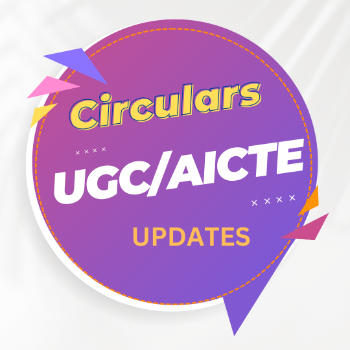New Updates
UGC Public Notice regarding: Invitation to Participate & Call for Abstract for Global Space Exploration Conference 2025 (Glex- 2025)
The University Grants Commission, in a circular dated October 15, 2024, invited colleges to participate in the Global Space Exploration Conference 2025 (GLEX-2025) and submit abstracts. GLEX-2025 aims to promote international cooperation, information sharing, and development in space exploration, bringing together leaders from science, engineering, business, and government for dialogue and networking. The event also offers a platform to showcase India’s space technology potential, and higher education institutions are encouraged to submit papers promptly and attend this prestigious conference.
UGC PhD Admissions Update (2024-25)
Starting from the 2024-25 academic session, PhD admissions will be determined based on National Eligibility Test (NET) scores.
Revised Guidelines According to NEP-2020
Category 1: Candidates with the highest NET scores qualify for PhD admissions, Junior Research Fellowships (JRF), and assistant professor positions.
Category 2: Candidates with the next highest NET scores are eligible for PhD admissions and assistant professor positions.
Interview Requirement: All candidates must undergo an interview as per UGC 2022 regulations for admission into PhD programs.
UGC NET 2024 June Examination Cancelled: Minister of Education Provides Explanation
The Ministry of Education has announced the cancellation of the UGC NET 2024 June examination due to concerns regarding its integrity. The decision to postpone the exam aims to ensure fairness in the testing process. The Central Bureau of Investigation (CBI) has been assigned to conduct additional inquiries on this issue. Originally scheduled for June 18, the exam attracted 9,08,580 candidates applying for Junior Research Fellowship, Assistant Professor positions, and PhD admissions. For updates on the rescheduled exam date, candidates are advised to visit ugcnet.nta.ac.in.
The University Grants Commission (UGC) and the All-India Council for Technical Education (AICTE) are pivotal organizations in India that are essential for regulating and advancing higher education. They significantly influence the development of arts, science, and technology education in the country.
UGC (University Grants Commission)
Role: The University Grants Commission (UGC) is a law-related body established by the Government of India in 1956 under the UGC Act, 1956. It supervises the coordination, strong desire/formal decision about something, and maintenance of college standards across India.
Scope: The UGC’s authority extends to all Indian universities, leaving out/keeping out institutions of national importance like the Indian Institutes of Technology (IITs) and Indian Institutes of Management (IIMs). It also includes thought of/considered universities and colleges recognized by the UGC.
Functions: Key functions of the UGC include:
- Granting recognition to universities and colleges.
- Setting and maintaining standards for teaching, examinations, and research.
- Providing money-based help for development and research projects in universities and colleges.
- Encouraging invention of new things and research in college.
- Overseeing and coordinating activities of universities and colleges.
AICTE (All India Council for Technical Education)
Role: At first established in November 1945 as a (group of people that give advice), the AICTE became a law-related body through an Act of Parliament in 1987. It controls and develops technical education in India.
Scope: The AICTE’s legal control/area of legal control covers technical education, including fields like engineering, (related to the beautiful design and construction of buildings, etc.), and pharmacy. It includes institutions offering diploma, undergraduate, and postgraduate courses in these fields of study.
Functions: The first (or most important) functions of the AICTE include:
- Approving and giving approval to technical education institutions.
- Beginning and building on (school courses) and standards for technical education.
- (helping increase/showing in a good way) research and development within technical education.
- Providing money available for development and research projects in technical institutions.
- Controlling the fees charged by technical institutions.


